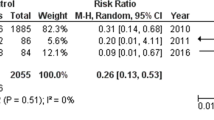Abstract
Medications that reduce gastric acid secretion are commonly prescribed for treating gastroesophageal reflux disease. However, several studies have shown that these medications are not very effective, and are associated with adverse effects. This article discusses the physiology of gastric acid secretion, clinical indications and pharmacology of acid suppressing medications, and possible adverse effects of these medications.
Similar content being viewed by others
References
Eichenwald EC; Committee on Fetus and Newborn. Diagnosis and management of gastroesophageal reflux in preterm infants. Pediatrics. 2018;142: pii:e20181061.
Winter H, Kum-Nji P, Mahomedy SH, Kierkus J, Hinz M, Li H, et al. Efficacy and safety of pantoprazole delayed-release granules for oral suspension in a placebo-controlled treatment-withdrawal study in infants 1–11 months old with symptomatic GERD. J Pediatr Gastroenterol Nutr. 2010;50:609–18.
Tighe M, Afzal NA, Bevan A, Hayen A, Munro A, Beattie RM. Pharmacological treatment of children with gastro-oesophageal reflux. Cochrane Database Syst Rev. 2014;11:CD008550.
Peter CS, Wiechers C, Bohnhorst B, Silny J, Poets CF. Influence of nasogastric tubes on gastroesophageal reflux in preterm infants: A multiple intraluminal impedance study. J Pediatr. 2002;141:277–9.
Richardson CT, Walsh JH, Cooper KA, Feldman M, Fordtran JS. Studies on the role of cephalic-vagal stimulation in the acid secretory response to eating in normal human subjects. J Clin Invest. 1977;60:435–41.
Frakaloss G, Burke G, Sanders MR. Impact of gastroesophageal reflux on growth and hospital stay in premature infants. J Pediatr Gastroenterol Nutr. 1998;26:146–50.
El-Mahdy MA, Mansoor FA, Jadcherla SR. Pharmacological management of gastroesophageal reflux disease in infants: current opinions. Curr Opin Pharmacol. 2017;37:112–7.
Ghaem M, Armstrong KL, Trocki O, Cleghorn GJ, Patrick MK, Shepherd RW. The sleep patterns of infants and young children with gastro-oesophageal reflux. J Paediatr Child Health. 1998;34:160–3.
Mercado-Deane MG, Burton EM, Harlow SA, Glover AS, Deane DA, Guill MF, et al. Swallowing dysfunction in infants less than 1 year of age. Pediatr Radiol. 2001;31:423–8.
Da Dalt L, Mazzoleni S, Montini G, Donzelli F, Zacchello F. Diagnostic accuracy of pH monitoring in gastro-oesophageal reflux. Arch Dis Child. 1989;64:1421–6.
Rosen R, Vandenplas Y, Singendonk M, Cabana M, DiLorenzo C, Gottrand F, et al. Pediatric Gastroesophageal Reflux Clinical Practice Guidelines: Joint Recommendations of the North American Society for Pediatric Gastroenterology, Hepatology, and Nutrition and the European Society for Pediatric Gastroenterology, Hepatology, and Nutrition. J Pediatr Gastroenterol Nutr. 2018;66:516–54.
Rudolph CD, Mazur LJ, Liptak GS, Baker RD, Boyle JT, Colletti RB, et al. Guidelines for evaluation and treatment of gastroesophageal reflux in infants and children: recommendations of the North American Society for Pediatric Gastroenterology and Nutrition. J Pediatr Gastroenterol Nutr. 2001;32:S1–31.
Tsou VM, Young RM, Hart MH, Vanderhoof JA. Elevated plasma aluminum levels in normal infants receiving antacids containing aluminum. Pediatrics. 1991;87:148–51.
Tsou VM, Bishop PR. Gastroesophageal reflux in children. Otolaryngol Clin North Am. 1998;31:419–34.
Mihatsch WA, Hogel J, Pohlandt F. Hydrolysed protein accelerates the gastrointestinal transport of formula in preterm infants. Acta Paediatr. 2001;90:196–8.
Chicella MF, Batres LA, Heesters MS, Dice JE. Prokinetic drug therapy in children: a review of current options. Ann Pharmacother. 2005;39:706–11.
Ballengee CR, Davalian F, Conaway MR, Sauer CG, Kaufman DA. Erythromycin and Reflux Events in Premature Neonates: A Randomized Clinical Trial. J Pediatr Gastroenterol Nutr. 2018;67:720–5.
Orenstein SR, Shalaby TM, Devandry SN, Liacouras CA, Czinn SJ, Dice JE, et al. Famotidine for infant gastro-oesophageal reflux: a multi-centre, randomized, placebo-controlled, withdrawal trial. Aliment Pharmacol Ther. 2003;17:1097–107.
Cucchiara S, Minella R, Iervolino C, Franco MT, Campanozzi A, Franceschi M, et al. Omeprazole and high dose ranitidine in the treatment of refractory reflux oesophagitis. Arch Dis Child. 1993;69:655–9.
Moore DJ, Tao BS, Lines DR, Hirte C, Heddle ML, Davidson GP. Double-blind placebo-controlled trial of omeprazole in irritable infants with gastroesophageal reflux. J Pediatr. 2003;143:219–23.
Omari TI, Haslam RR, Lundborg P, Davidson GP. Effect of omeprazole on acid gastroesophageal reflux and gastric acidity in preterm infants with pathological acid reflux. J Pediatr Gastroenterol Nutr. 2007;44:41–4.
Barron JJ, Tan H, Spalding J, Bakst AW, Singer J. Proton pump inhibitor utilization patterns in infants. J Pediatr Gastroenterol Nutr. 2007;45:421–7.
Funding
Funding: None; Competing interests: None stated.
Author information
Authors and Affiliations
Corresponding author
Rights and permissions
About this article
Cite this article
Murthy, P., Dosani, A. & Lodha, A. Acid Suppression in Neonates: Friend or Foe?. Indian Pediatr 56, 541–546 (2019). https://doi.org/10.1007/s13312-019-1549-8
Published:
Issue Date:
DOI: https://doi.org/10.1007/s13312-019-1549-8



